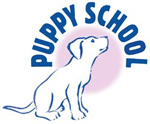 Puppy School training class content - What will my puppy learn?
Puppy School training class content - What will my puppy learn?
At our Puppy training classes, only kind training methods are used. Puppy School class content contains the following exercises:
- Come when called
- Sit, lie down and stand on command
- Walk on a loose lead without pulling
- Get used to being handled and examined for vets and groomers
- 'Stay'
- 'Settle'
- 'Gentle’ (taking food from hands gently)
- Accept people near to food bowls, bones and chews
- Stop play biting
- Socialise with an adults, children, and other puppies attending class
- Greet people appropriately without jumping up
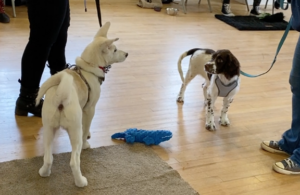
Puppy greetings
Prolonged play with other pups can be harmful (shy pups can get scared, boisterous pups can learn to be rough, and all can get over excited and a bit too wild for good interactions), so we take our puppy greetings very slowly, teaching you first how to teach your puppy to turn away from things of interest, and, later, from other puppies. This allows for carefully controlled, short but beautiful meetings between puppies, allowing them to make friends gradually and develop confidence.
In a similar way, puppies need to learn to be calm and happy to meet humans, so we have a special programme of introduction to other human members of the class, allowing even shy puppies to feel safe when socialising, and, for those more boisterous, to learn how to greet humans appropriately without jumping.
Behaviour advice
Throughout the course, we are on hand to help you with any behaviour problems you may be experiencing with your puppy from play-biting to jumping up.
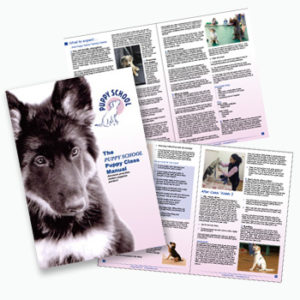
Practice makes perfect
Although all the information you will need to train your puppy will be given to you in class, you will need to set aside time every day to practice the exercises at home to make the most of the ideas you have been given. Training at home will allow you to progress further in class and will result in a better trained puppy at the end of the six weeks.
As part of our course, clients will receive a helpful Puppy School manual which will allow you and your puppy to practice the techniques in lessons prior to the next class.
Too old for puppy training at Puppy School classes?
Puppies need to begin classes between 12 - 20 weeks old so that they are all at a similar stage of development. This allows them to play together easily. Since good classes get booked up quickly, it is recommended that you reserve your place as soon as can, even before you get a puppy if possible. Please contact us if your puppy is older than 20 weeks of age and we can chat through some options with you.

Regular monitoring for Puppy School classes
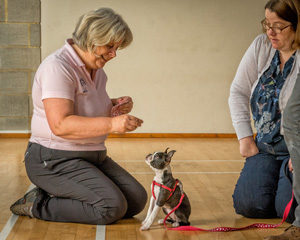 Puppy School Tutors would have undertaken a comprehensive training course with Puppy School Founder and leading behaviourist Gwen Bailey. All Puppy School Tutors are kept up to date with new ideas by regularly attending meeting including Puppy School conferences and exclusive Puppy School courses by leading trainers/behaviourists. In addition, tutors regularly attend seminars and conferences run by groups such as CABTSG, APBC, and BSAVA.
Puppy School Tutors would have undertaken a comprehensive training course with Puppy School Founder and leading behaviourist Gwen Bailey. All Puppy School Tutors are kept up to date with new ideas by regularly attending meeting including Puppy School conferences and exclusive Puppy School courses by leading trainers/behaviourists. In addition, tutors regularly attend seminars and conferences run by groups such as CABTSG, APBC, and BSAVA.
Classes are monitored regularly to ensure high standards. All Puppy School Tutors are well trained in the latest training techniques, as well as in human and animal behaviour. Regular refresher courses and an email forum for tutors ensure they stay up-to-date.
For further information, visit www.puppyschool.co.uk
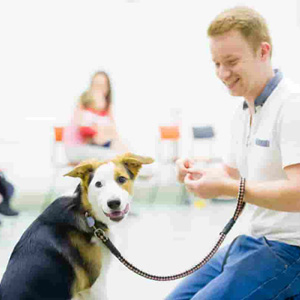 Reward-based puppy training
Reward-based puppy training